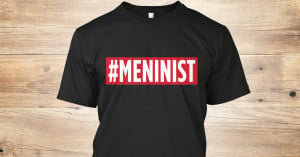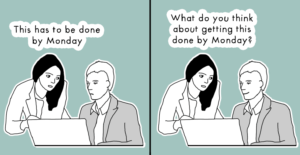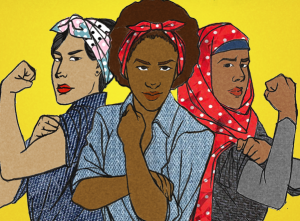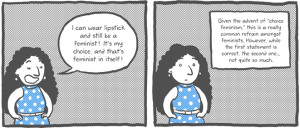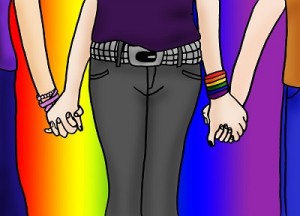So you’re a man and you consider yourself an awesome ally to women. You may even identify as a feminist and actively work to further the movement’s goals.
That’s all great, but it doesn’t give you a pass when it comes to sexism — and you may be perpetuating it without even knowing it.
“But I’m not sexist. I don’t hate women!” you might say.
Let me stop you right there, as I (and likely most other people who have called out sexism) are told this all the time.
Loving and respecting women has nothing to do with whether or not your actions are sexist, and you certainly don’t have to hate women to be a sexist.
In reality, the simple fact that you are an active participant in a culture that privileges men, especially white, cis, straight men, over all others means that, at the least, you benefit from sexism, and, at the worst, you actively participate in it.
So, no, you don’t have to hate women to be sexist. In fact, the truth is far from it. Many times, your unconscious thoughts, actions, and words are still sexist because sexism is often caught up in the subtle things you do without even realizing you do them.
It’s all in the details, folks.
It might be a hard truth to accept, but when you do, you can start the process of recognizing how these things happen and addressing how you can change it.
And this is important because, after all, recognizing that your own actions may be sexist isn’t about you. It’s about the people you’re hurting.
This conversation is much bigger than whether or not men, or you in particular, are unconsciously sexist. It is about how our society creates sexist situations and we all perpetuate them without even knowing it.
Each of us deserves to feel safe, regardless of our identity, and these actions interfere with that safety. So if you really love women and identify as a feminist or ally, it is important to examine how you may be participating in this system.
So how can you be sexist without even knowing it?
Subtle Sexism Through Microaggressions
Perhaps the most common way you can perpetuate or participate in sexism, without knowing it, is through sexist microaggressions.
Microaggressions, defined as “small, subtle, often unconscious actions that marginalize people in oppressed groups,” was coined by Chester Pierce to discuss the subtle acts of racism that were prominent in the 1970s. Since then, it has been used to describe any number of unconscious ways we might further marginalize somebody.
In other words, these are the less-conscious little things you do everyday that are harmful (and oppressive!) to marginalized people.
Microaggressions are a result of internalized biases, presumptions, and stereotypes about marginalized people and groups. They consist of the things you might even know not to be true, but that have been so thoroughly reinforced by our culture that they occasionally (and unintentionally) leak out into our everyday lives through our actions and words.
But, even if you have good intentions and don’t mean something “in that way,” microaggressions are still insidious. Even in their subtlety, all those “unintentionally” sexist comments and actions gradually build upon each other — and they sting.
In the end, they reinforce the problematic societal structures we are actively fighting back against as feminists. And that is exactly why you need to listen when somebody calls you out instead of fixating on whether or not you love women or are a feminist.
Microaggressions create hostile environments at home, in the workplace, or in social settings by serving as a constant reminder of their inequitable position in society. They casually put people “back into their place” by reinforcing prescribed gender norms and their shadow of inequality.
They validate a culture where women still make less than the average man doing the same work, and that women of color make even less than white women. They perpetuate the undervaluing of domestic work is because of it’s association with femininity. They even prod us to evaluate if our own bodies are up to par with what society deems to be acceptable.
By telling people how they should act based on their gender, sexist microaggressions also attempt to push people back into narrowly defined gender binary categories. This, in turn, erases anybody who falls outside of those categories, such as trans and non-binary folks.
How Might This Look?
Often, sexist microaggressions take the form backhanded comments made to a woman in passing, like telling your friend they did a good job lifting something “for a woman,” or telling a woman at work that she is being too emotional about a decision and needs to look at a problem more logically.
These are generally pretty easy to spot and are often something you might be called out for doing.
They may also take on the form of jokes you make with your buddies when there are no women around. Have you ever joked about “the old ball and chain?” What about telling women to “get back in the kitchen?” These things may seem like they’re all in jest, but in reality, these kind of jokes rely on — and promote — sexist stereotypes and gender norms.
Often, these subtle acts of sexism are not as obvious.
One of the most common forms of sexist microaggressions we encounter every day is chivalry, and it can also be the most dangerous — because, more often than not, it’s well intentioned. You may realize that you’re doing it, but you may not have considered that these actions are laced with sexist assumptions.
Now, I can picture a whole lot of you screaming at me through your computers right now: “I was just trying to be kind and courteous by opening doors for women or insisting on paying the bill at dinner.”
Well, that’s great, and you may mean well, but let’s stop and examine the implicit sexism steeped in the roots of these gestures that are so often veiled in kindness.
As social just blogger Ashley Robinson explained, chivalry often just amounts to “small acts of condescension, steeped in implicit and explicit assumptions that women are delicate, incapable, and need to be tended to.”
These actions find their roots in the assumption that women are fragile and delicate, that women are no more than property for men to take care of.
So, as a result, you grab the door for a woman when you see her coming or insist on carrying something heavy for them.
And that’s the thing about microaggressions: They often don’t show up as grand, active sexist gestures that are easy to recognize. They’re the little things that you do, often in a well-meaning way.
But there is so much more to them.
These microaggressions may seem like nothing more than harmless actions or words, but they add up. When it comes to sexism, they are powerful tools of the patriarchy that serve to further other and silence women by constantly reminding them that they still aren’t really equal.
Fighting Back Against Microaggressions
Now, your first reaction may be guilt, but this isn’t always something you should get caught up on.
Microaggressions aren’t things you necessarily mean to do. These are the things you do without even realizing you’re doing them because they are so ingrained in us by a culture that treats them as normal.
So instead of feeling guilty, take a moment to examine both your own behavior and the society that fosters it as the norm.
To really get to addressing microaggressions, one first has to realize why they don’t notice they are doing these things—and the answer is privilege.
As a feminist or an ally to women, you may already think you’ve “checked” it, but not realizing how you are enforcing sexism is a perfect example of how your privilege is something inescapable that you benefit from unconsciously.
Microaggressions are reminders that you are participating in and benefiting from a system that actively oppresses others without even knowing it. Never having to consider how your passing comments and actions may impact marginalized people proves that.
So start to take a good, hard look at how you’re participating in sexist microaggressions and how it may be impacting the people in your life.
And don’t stop there! It’s likely that these microaggressions exist across lines of identity in much the same way oppression does, so take a look at whether you’re acting differently because you’re talking to a woman of color, a lesbian, a trans woman, a poor woman, a woman with disabilities, and women of varying ages.
When you start to see what these acts may be, apologize for them. Then start to interrogate why you said or did them in the first place. Ask yourself about what stereotypes they rely on, what assumptions they make about marginalized people, and what aspects of sexism and oppression they perpetuate.
Most importantly, make an active effort to stop doing them.
Please don’t take my call for self-examination as an insistence that you should be rude to every woman you meet from this point forward in hopes of turning your back on chivalry.
As Kelsey Lueptow explained for Everyday Feminism, the problem with chivalry isn’t that you shouldn’t be nice to people, it’s that it often is not mutual. There are simply just better ways to be nice to people.
So instead of being nice to a woman because they are a woman, try being kind to them because you should be nice to all humans. Recognize that kindness and respect are two things everybody is inherently worthy of and that those things shouldn’t be dependent on one’s gender.
Don’t give up on kindness, but do examine the “why” behind your actions.
Sexist microaggressions may often be unconscious, but they are things we can do something about. So next time somebody calls you out, it is high-time you listen.
[do_widget id=”text-101″]
Ally Boguhn is a feminist activist and media researcher living and working in Washington, DC. She completed both her B.A. in Communications and Art History as well as her M.S. in Professional Communications at Clark University, where she researched abortion debate rhetoric. Ally is also the founder and editor of Because I am a Woman, a blog devoted to intersectional feminism and reproductive justice. In her spare time, you can find her at an art museum, consuming massive amounts of coffee while writing, or trying to convince her cat to go for walk. You can follow Ally on Twitter @AllyBoguhn. Read her articles.
Search our 3000+ articles!
Read our articles about:
Our online racial justice training
Used by hundreds of universities, non-profits, and businesses.
Click to learn more







